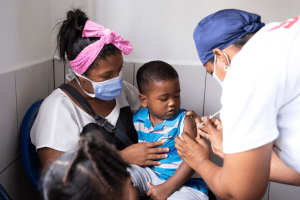
By Anna Carolina Ortiz, MPH | Associate Director, Global Public Health and Development | Latin America
Vaccination has long been hailed as one of the most effective tools in modern medicine, preventing countless diseases and saving lives worldwide. In Latin America, vaccination programs have played a pivotal role in improving public health and fostering healthier communities. In this blog post, we’ll dive into the vital role of vaccination in Latin America and how these programs have made a lasting impact on the region.
Imagine a world without vaccines—where diseases like polio, measles, and smallpox still wreak havoc on populations. Thanks to vaccination programs, Latin America has made remarkable progress in eradicating and controlling these once-deadly diseases. Vaccines introduce harmless parts of the disease-causing agent (like a protein) to stimulate the immune system. This way, the body “learns” to recognize and fight the real disease if encountered in the future.
Impact on Public Health
1. Disease Prevention: Vaccination programs have drastically reduced the incidence of diseases that once posed significant threats. Diseases like measles and rubella, which were once major concerns, have been largely controlled due to widespread vaccination.
2. Herd Immunity: Vaccination not only protects individuals but also creates a shield of protection for the entire community. When a large portion of the population is vaccinated, it becomes difficult for diseases to spread, safeguarding those who cannot receive vaccines due to medical reasons.
3. Healthcare Savings: Preventing diseases through vaccination reduces the burden on healthcare systems. Fewer cases mean fewer hospitalizations, lower treatment costs, and more efficient use of medical resources.
Success Stories in Latin America
1. Polio Eradication: Through rigorous vaccination campaigns, Latin America achieved polio eradication in the 1990s. This monumental achievement stands as a testament to the power of unified efforts and sustained immunization programs.
2. Measles Control: Several countries in the region have made significant strides in controlling measles, a highly contagious disease. Vaccination efforts have led to a substantial reduction in measles cases and outbreaks.
3. Access to Remote Areas: In many Latin American countries, vaccination programs reach even the most remote and underserved communities. This commitment to inclusivity ensures that everyone, regardless of location, can benefit from vaccination.
Challenges and Future Outlook
While vaccination programs have achieved remarkable success, challenges remain. Vaccine hesitancy, limited access in some areas, and the emergence of new diseases underscore the ongoing importance of robust immunization initiatives. Continued education, collaboration among stakeholders, and sustained investment are key to maintaining and expanding the gains made through vaccination.
Vaccination programs stand as beacons of hope in Latin America’s journey toward better public health. Through these initiatives, communities have experienced the tangible benefits of disease prevention, community protection, and improved well-being. As we move forward, let’s celebrate the progress made and remain committed to ensuring that vaccines continue to be accessible, effective, and a cornerstone of healthier societies across Latin America. After all, a world protected by vaccines is a world where health knows no boundaries.

